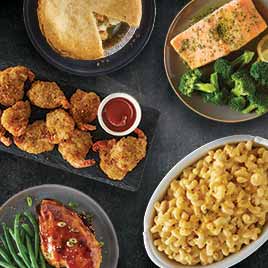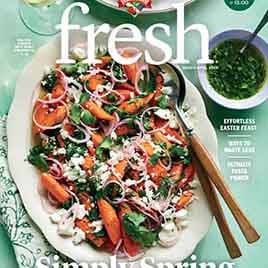We make it easy for you
 Our seafood sourcing policy means that, if a seafood product is sold at Hannaford, it was harvested in a manner that ensures its availability today and long into the future.
Our seafood sourcing policy means that, if a seafood product is sold at Hannaford, it was harvested in a manner that ensures its availability today and long into the future.
At Hannaford, you can trust that the seafood products you buy in our stores are brought to you in a way that you can feel good about. Since 2012, all seafood products sold in Hannaford stores are fully traceable to the wild fishery or farm, and come from sustainable sources.
We ensure that seafood products sold in our stores are harvested in a sustainable manner. For us, this means that seafood is fished or farmed in a way that means it will be around for generations to come. We will only sell seafood from fisheries and farms that are managed by competent authorities that use a science-based approach to their management plans.
We work closely with our suppliers to make sure we know where the seafood we sell comes from.
- Our suppliers provide traceability back to port of landing or seafood farm.
- Every seafood product in the store is traceable, whether it's located in the fresh, frozen, or grocery sections of our store.
Customers can email our seafood expert to find out from where a particular item originates.
This fish story is all true.
Hannaford's sustainable seafood policy covers the widest range of products among all major U.S. grocery companies.
- Products in our fresh, frozen, or grocery departments are fully comply with our sourcing policy, making Hannaford (and all the banners in Delhaize America) the first major supermarket in the country to accomplish this.
- The policy covers more than 1000 seafood items.
- The policy applies to fresh seafood and food products with fish as a primary ingredient as well as to seafood soups and chowders.
Here today. Here tomorrow.
We buy from suppliers who ensure the long-term health of marine resources.
- Hannaford recognizes that there are fisheries and farms that are well managed, and others that are not. To encourage the producers that act responsibly, Hannaford will work with these suppliers to find sources that comply with our sustainability and traceability criteria rather than ban an entire species due to problems in some areas. If suitable sources are not found, then we will not sell that product.
- Our approach focuses on the health of individual fisheries – specific geographic regions from which a species is harvested. This approach ensures that purchasing decisions are made on the merits of sustaining individual seafood populations (and the local fishermen who rely on them), not broad categories or species.
- Our wild-caught seafood comes from source fisheries governed by credible, enforceable and science-based management plans.
- Management plans govern the amount, timing and method of harvesting to ensure that seafood populations will thrive well into the future.
- Monitoring and compliance measures are in place to ensure that harvest levels are maintained within appropriate limits.
We're all in this boat together.
 Hannaford is committed to the long-term health and sustainability of the world's supply of seafood. We're also committed to working with our existing suppliers to improve and preserve the earth’s ecosystems and its biodiversity.
Hannaford is committed to the long-term health and sustainability of the world's supply of seafood. We're also committed to working with our existing suppliers to improve and preserve the earth’s ecosystems and its biodiversity.
We work with The Gulf of Maine Research Institute, GMRI and our existing supply base to make continual and incremental improvements in harvesting methods that decrease bycatch, promote distribution methods that decrease food miles, and improve handling – all of which enhance the quality of seafood products.
For farmed products, we're requiring certification by the The Global Aquaculture Alliance, GAA; an international, nonprofit trade association dedicated to advancing environmentally and socially responsible aquaculture. GAA recognizes that aquaculture is the only sustainable means of increasing seafood supply to meet the food needs of the world's growing population. Through the development of its Best Aquaculture Practices (BAP) certification standards, GAA has become the leading standards-setting organization for aquaculture seafood.
Hannaford will only sell products harvested using legal methods in regulated environments. We work proactively with GMRI, GAA and our suppliers and the fishing community to encourage investment in gear and farming technologies that reduce adverse seafood production impact on the environment.
Finally, Hannaford is committed to educating our associates and customers on seafood sustainability issues. All of our associates involved with fresh seafood have been given training on our policy and understand our commitment to sustainable seafood products. Information is available in our stores and through our Web site to empower our customers to make responsible and informed decisions based on their values around health, community and the environment when they are shopping for seafood.
Our Seafood Sustainability Commitment
 Hannaford customers can trust that the seafood products they buy in our stores are brought to them in ways that they can feel good about.
Hannaford customers can trust that the seafood products they buy in our stores are brought to them in ways that they can feel good about.
All seafood products sold in Hannaford stores are fully traceable to the wild fishery or farm. They come from sustainable sources.
We ensure that the seafood products sold throughout our stores are harvested in a sustainable manner. For us, this means that seafood is fished or farmed in a way that it will be around for generations to come. We will only sell seafood from fisheries and farms that are managed by competent authorized authorities that use a science-based approach to their management plans. more on our policy details >>
In addition, Hannaford has partnered with well-respected third parties, like the Gulf of Maine Research Institute and the Global Aquaculture Alliance to ensure policy transparency. We require all of our suppliers to provide traceability back to source fishery for wild caught species, and back to the farm for farmed species, for all of the products we sell. This practice ensures that our products are harvested from sources we have assesed and approve of.
Hannaford will continue to work with our suppliers to identify opportunities to improve the sustainability of seafood products we sell. These improvements include promoting fishery improvement projects and harvesting methods that decrease by-catch, distribution networks that decrease food miles, improved handling to maintain the quality of product, etc. We will work to reward suppliers who source products that utilize these voluntary measures.
Hannaford commits to educating associates and customers on seafood sustainability issues. Associates will be trained to understand the complexity of seafood issues. Our company also will ensure that our suppliers are aware of seafood sustainability issues and that they are prepared to address them.
Hannaford will make information available to our customers in publications, at the point of sale, and online to empower them with the information they need to make responsible and informed purchasing decisions based on their own environmental and community health values.
For more information regarding sustainable seafood at Hannaford stores click here.
Seafood Products
Hannaford defines seafood products as fresh fish, food products with fish as a primary ingredient, or seafood soups and chowders wherever they appear in the store, be that Fresh, Frozen Food or Grocery departments.
Sustainability Requirement Details
Hannaford will not sell any seafood that is harvested using illegal methods, such as dynamite, poison, or a similarly destructive harvesting method. Our company will only sell products harvested using legal means in regulated environments and will work proactively with the industry to encourage investment in gear and farming technologies that reduce seafood production's impact on the environment. We will prioritize our sourcing to those harvesting methods that have the least impact on the environment and ecosystem, and that have the least amount of by-catch.
Hannaford commits to sell only seafood from fisheries that are managed by competent authorities and have a management plan in place that incorporates a science-based approach to ensure sustainability.
Management plans should consist of the following tenets*:
- If stock sizes are below management target levels, whether due to natural or man-made causes, management plans are established that enable rebuilding within a specified timeframe.
- Sufficient data exists to determine appropriate harvest levels or practices.
- Monitoring and compliance measures are in place to ensure that harvest levels are maintained within acceptable limits.
- Enforcement exists to ensure that harvesters follow regulations and to prevent illegal practices and unreported harvest.
Third Party Verification
All suppliers of wild harvested seafood sold in Hannaford stores have demonstrated that their products meet the Seafood Sustainability Requirement defined in this document.
All farm-raised seafood sold in Hannaford stores shall be certified by the Best Aquaculture Practices (BAP) Certification Management Group, a program coordinated by the Global Aquaculture Alliance, where a BAP standard is available. BAP certification ensures that the production of the product does not negatively impact communities, workers, the environment, or human health through inappropriate use of chemicals or drugs. Hannaford also will accept ASC or other equivalent certifications. These will be reviewed and approved on an individual basis. Lacking a specific standard to be certified against, the supplier will be asked to meet the following
Alternate Minimum Aquaculture Guidelines
Property Rights and Regulatory Compliance
Farms shall comply with local and national laws and environmental regulations, and provide current documentation that demonstrates legal rights for land use, water use, construction, operation and waste disposal.
Community Relations
Farms shall strive for good community relations and not block access to public areas, common land, fishing grounds or other traditional natural resources used by local communities. Worker Safety and Employee Relations Farms shall comply with local and national labor laws to assure adequate worker safety, compensation and, where applicable, on-site living conditions.
Wetland Conservation And Biodiversity Protection
Aquaculture facilities shall not be located in mangrove or other sensitive wetland areas where they displace important natural habitats. Farm operations shall not damage wetlands or reduce the biodiversity of other ecosystems. Wetland area removed for allowable purposes shall be mitigated.
Effluent Management
Farms shall monitor their effluents to confirm compliance with BAP effluent water quality criteria. In lakes, reservoirs and estuaries, operations shall comply with feeding rate limits.
Fishmeal and Fish Oil Conservation
Farms shall accurately monitor feed inputs and minimize the use of fishmeal and fish oil derived from wild fisheries.
Soil and Water Conservation
Farm construction and operations shall not cause soil and water salinization or deplete groundwater in surrounding areas. Farms shall properly manage and dispose of sediment from ponds, canals and settling basins.
Control of Escapes, Use of GMOs
Certified farms shall take measures to minimize escapes of farm stock and comply with governmental regulations regarding the use of native and non-native species, and genetically modified organisms.
Storage and Disposal of Farm Supplies
Fuel, lubricants and agricultural chemicals shall be stored and disposed of in a safe and responsible manner. Paper and plastic refuse shall be disposed of in a sanitary and responsible way.
Animal Welfare
Producers shall demonstrate that all operations on farms that involve fish are designed and operated with animal welfare in mind. Employees shall be trained to provide appropriate levels of husbandry.
Drug and Chemical Management
Banned antibiotics, drugs and other chemical compounds shall not be used. Other therapeutic agents shall be used as directed on product labels for control of diagnosed diseases or required pond management, not prophylactic purposes.
Microbial Sanitation
Human waste and untreated animal manure shall be prevented from contaminating pond waters. Domestic sewage shall be treated and not contaminate surrounding areas.
Harvest and Transport
Fish shall be harvested and transported to processing plants or other markets in a manner that maintains temperature control and minimizes stress, physical damage and contamination.
Transparency
In order to ensure the credibility of our statements, positions, and actions, transparency in the program is essential. For us, transparency means the following:
- Making the Seafood Sourcing Policy public
- Review and update the policy on an annual basis
- Releasing annual status summarizing annual goals and actions in achieving those goals
- Making seafood education material available to public, which includes but is not limited to:
- In-store product labels or signage
- Operating company websites, on products
- Other marketing materials communicated to the public
Traceability Requirement
Hannaford requires traceability to the source fishery or farm pond of all seafood sold fresh, frozen, or in value-added products. Hannaford shall have immediate access to information on where the product was harvested.
Continuous Improvement
Hannaford will partner with the Gulf of Maine Research Institute to identify opportunities to improve upon the sustainability of Gulf of Maine products, even beyond what is required by regulatory agencies. These improvements might include participation in fishery improvement projects and harvesting methods that decrease bycatch, distribution networks that decrease food miles, improved handling to maintain the quality of product, and so on. Hannaford will work to reward suppliers who source products that utilize these voluntary measures.
Seafood Education
Hannaford commits to educating its staff and customers on seafood sustainability issues. Employees will be trained to understand the seafood issues and to assist customers in deciding which seafood products to choose. Hannaford will further ensure that its suppliers are aware of seafood sustainability issues and that they are prepared to address them.
Hannaford will make information available to customers in publications, at the point of sale, and online that empowers them with the information they need to make responsible and informed purchasing decisions based on their own values around community, the environment, and their health.
* Certain specific species having credible scientific agreement that the fishery is not at risk may be exempted from one or more of these tenets. Those species are:
- Hoe Harvested Shellfish – Globally
- Crawfish – from China
- Squid – Globally
Due to concerns surrounding the effectiveness of RFMO (regional fishery management organizations) to manage and enforce tuna fisheries, the additional requirement of demonstrating partnership with ISSF (International Seafood Sustainability Foundation) is required for all vanned tuna suppliers
Frequently Asked Questions
What is Hannaford's sustainable seafood commitment?
As of March, 31, 2012, Hannaford has committed to sourcing all of the seafood it sells from sustainably harvested fisheries and farms. This commitment helps to ensure that seafood will be available for future generations and that its production has minimal impact on the environment. For more detailed information regarding this commitment, refer to our Sustainable Seafood Policy.
Does Hannaford ban certain species?
Hannaford recognizes that there are fisheries and farms that are managed well, and others that are not. To encourage the producers that act responsibly, Hannaford does not ban an entire species due to problems in some areas. Instead, we work with our suppliers to find sources that comply with criteria around sustainable practices and traceability. If such sources are not found, then Hannaford will not sell that product.
How can I tell which products meet Hannaford's sustainability criteria?
All food products at the seafood counter, in the center of the store (e.g., canned fish), and in the frozen section meet the criteria outlined in our policy.
How does Hannaford know whether the seafood it sells complies with its policy?
Hannaford requires full traceability of all the seafood it sells to ensure we know how it was harvested. Additionally, we are working with the Gulf of Maine Research Institute to verify that the fisheries that supply our seafood are responsibly managed. For farmed products, we require certification by The Global Aquaculture Alliance's Aquaculture Certification Council.
How does this commitment compare to other retailers?
Hannaford's sustainable seafood policy covers the widest range of products among major U.S. grocery companies with approximately 1000 sold in our fresh, frozen, and grocery departments in compliance with our policy.
Where can I go with more detailed questions?
We greatly appreciate comments and questions. Simply Ask the Expert to begin talking with us about sustainable seafood.









 Our seafood sourcing policy means that, if a seafood product is sold at Hannaford, it was harvested in a manner that ensures its availability today and long into the future.
Our seafood sourcing policy means that, if a seafood product is sold at Hannaford, it was harvested in a manner that ensures its availability today and long into the future. Hannaford is committed to the long-term health and sustainability of the world's supply of seafood. We're also committed to working with our existing suppliers to improve and preserve the earth’s ecosystems and its biodiversity.
Hannaford is committed to the long-term health and sustainability of the world's supply of seafood. We're also committed to working with our existing suppliers to improve and preserve the earth’s ecosystems and its biodiversity. Hannaford customers can trust that the seafood products they buy in our stores are brought to them in ways that they can feel good about.
Hannaford customers can trust that the seafood products they buy in our stores are brought to them in ways that they can feel good about.